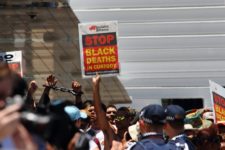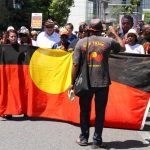Indigenous Teen Shot Dead by Police

The family of an Indigenous man shot by police over the weekend at a remote Indigenous community in the Northern Territory are still desperately trying to find out what happened to their son.
19-year old Kumanjayi Walker died after being shot by police officers on Saturday night in Yuendumu, a town about 300 kilometres north-west of Alice Springs, with a population fewer than 800 people.
Shot in the head
Very few details are known at this stage about the incident. Statements released by the Northern Territory police confirm that Mr Walker was shot in the head during an altercation with officers as they were trying to attest him for ‘a number of outstanding offences’ and died a short time later. It is not clear what the ‘outstanding offences’ are.
Police say Mr Walker was ‘armed with a weapon’ and ‘lunged at officers’, but they have not confirmed what the weapon was, nor have they been able to explain why the officers were using guns instead of other non-lethal weapons such as tasers.
Lack of medical support
It’s understood that there were no medical staff in the town of Yuendumu over the weekend. Due to a series of recent break-ins, staff had made the decision to leave. Officers instead performed first aid an ambulance was dispatched from a nearby town but Mr Walker as dead by the time it arrived.
The family of the victim says they were not notified of his condition – whether he was dead or alive – for at least eight hours after the incident occurred. It also not known whether the custodial notification service (CNS) was alerted that Mr Walker had been taken into custody.
Custody Notification System
The CNS service was one of the key recommendations of the 1991 Royal Commission into Aboriginal Deaths in Custody. It is a 24-hour legal advice and RU OK phone line overseen by the Aboriginal Legal Service (ALS) and when contacted, it can arrange legal help or whatever assistance is required to ensure the wellbeing and safety of the person in custody.
This service is supposed to operate nationally, but only the Northern Territory, Western Australia and Victoria have implemented it. New South Wales operates a similar service.
Police have also said that one officer was injured in the incident and two shots were fired, but a woman who witnessed the shooting has told media that she heard three gun shots.
Internal investigation
An internal police investigation is now underway and this will be overseen by a senior investigator from the Major Crime Unit in conjunction with Professional Standards Command.
The NT State Coroner has been briefed too because the incident is being treated as a ‘death in custody’ and across Australia, all deaths in custody are subjected to a coronial inquest.
At present, no decisions have been made about whether the officers involved will be stood down or suspended while the investigation occurs. But additional police have been brought into the town from Alice Springs and Darwin to maintain community safety, and quell potential unrest. At one stage on Saturday evening, about 200 people surrounded the police station where officers had locked themselves in and its understood there is some tension between police and members of the community.
Royal Commission
The Royal Commission into Aboriginal Deaths in custody was held in 1991 – 28 years ago. At its conclusion the commission made 339 recommendations. A report by Clayton Utz in 2015 found that almost 25 years later, many of these recommendations had not been implemented. Since the Royal Commission more than 420 Aboriginal deaths in custody have been recorded.
Analysis of these deaths shows that two of the most significant causes of Indigenous deaths in custody are the lack of access to appropriate medical care and the failure of police to follow protocol and procedures.
Only time and proper investigation will determine what caused the death of Kumanjayi Walker… and provide meaningful answers to all of the questions that surround the fact that a 19 year old was shot in the head by police while they were arresting him.
Aboriginal and Torres Strait Islander people are proportionally the most incarcerated people on earth. They account for 28 percent of the prison population in this country, but less than 3 percent of the overall populace.







